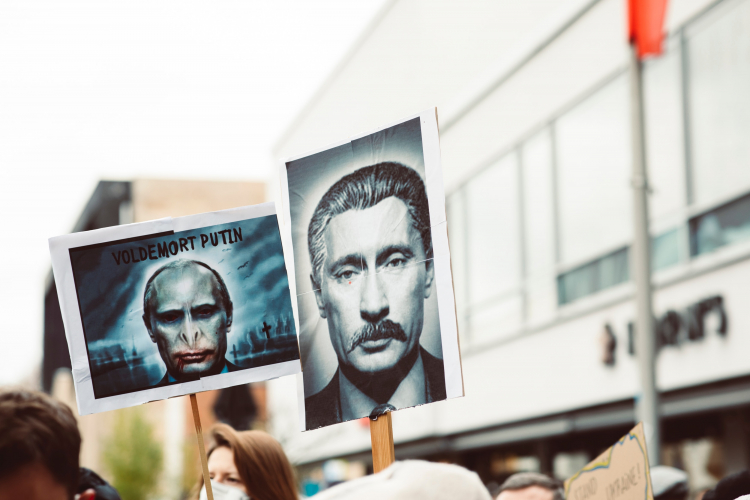We're Playing Checkers; Putin's Playing Chess

In the weeks leading up to Vladimir Putin’s invasion of Ukraine, the world spectated and speculated on Russia’s increasingly aggressive actions near the Ukrainian borders. Pundits and commentators worldwide insisted that there was little to no strategic advantage to invading Ukraine and that Putin was simply posturing. Those same people proclaimed to be stunned on February 24, 2022, when Putin officially launched his tri-pronged excursion into Ukrainian territory.
Since then, the only rationale that western politicos have been able to reach is that Putin is not a rational actor. On this topic, Norwich University says, “The most widely cited foreign policy analysis approach is the rational actor model. This approach assumes that the main actor in foreign policy is a rational individual who can be relied on to make informed, calculated decisions that maximize value and perceived benefits to the state.”
Image credit: Unsplash/KhashayarBy calling him a non-rational actor, it becomes assumed that he is not making informed or calculated decisions in order to benefit Russia. This is a problematic approach for several reasons. First, Russian domestic policy needs to be addressed. In recent years, Putin’s power, regardless of his legislative attempts in the Duma to appoint himself as an eternal leader, has waned. That isn’t to say that there has been any serious opposition or attempt on his presidency, but the rumblings of potential dissidents gaining popularity around the country, such as Alexei Navalny, have made Putin paranoid. Combined with an increasingly challenged economy, exacerbated by COVID-19 and a global inflation crisis, Putin, justifiably or otherwise, felt that he needed something to once again grasp absolute power domestically.
However, it is not only Putin’s perception of his own domestic political power that informed his decision to invade Ukraine. Arguably, more important than the internal situation is Putin’s view of foreign policy. During his lifetime, Russia has devolved from an imperial-like global superpower and genuine competitor with the United States as the Soviet Union to a singular country, albeit sizable, with waning importance in the global economy and institutions. Putin has made it clear in the past, in Crimea, the Balkans, and the Baltics, that he does not view former Soviet republics as independent sovereign entities, but as runaway Russian provinces.
It is this quasi-pax-Russia that is imperative to understanding Putin’s politics. He does not feel that he is squashing democratic sovereignty in Ukraine, but that he is simply freeing imprisoned Russian citizens from the squalor of accouchement with the West.
Image credit: Unsplash/LeviMeirClancyMoreover, his tactics are not new. This playbook has been used before; in Chechnya. New York Times contributor, Carlotta Gall describes her time in Chechnya in comparison to the coverage of Ukraine and says, “There was much in the experience (of Chechnya) that echoes in Ukraine today. Even though nearly 30 years have intervened, it is staggering to see Russia employ many of the same tactics — and mistakes — in Ukraine. Despite the hard lessons learned in Chechnya, and in Afghanistan before that, Russian troops drove down the main highways with their tanks and fuel trucks in an attempt to seize control of the Ukrainian capital in the first weeks of March.”
Moreover, Putin understands how to play a long game. Of course, he thought this invasion would last a matter of days, but even with these initial miscalculations, Putin is not afraid of a longer engagement. He has used it as an opportunity to crack down internally on dissidents and anyone weary of this war, all while the West’s focus is fixed on Ukraine. He has ensured, willing or otherwise, his own domestic support. Along with this rationale, even if Putin is completely unsuccessful in Ukraine and the war ends with not a single kilometer of Ukrainian territory given to Russia, he has still massively inflamed internal struggles within the country.
Ethnic Russians and Russian speakers have become as polarized as ever, thus even if he completely loses, which is relatively unlikely, he has still won in a way. In the process, he may have temporarily unified NATO, but he has highlighted immense challenges in member-states. The EU’s reliance on Russian natural resources, the unwillingness of the United States to engage with Russia, and the fact that the EU’s de-facto leaders, France and Germany, have spent the past decade attempting to deeper integrate Russo-European relations, all have been skillfully displayed with Russia's war in Ukraine.
Finally, it is not at all to say that Putin’s decisions are beneficial to Russia, or that they are morally correct; in fact, quite the opposite. Yet, the classification of Putin as a non-rational actor is a cheap deflection by those who mispredicted Putin’s actions in the lead-up to the war. Putin is, in fact, politically rational. The difference is that he is completely capable, willing even, to let his people suffer, even those he wishes to eventually integrate, so that he may fulfill what he believes to be a greater vision of Russia and restore it to its once imperial status.









